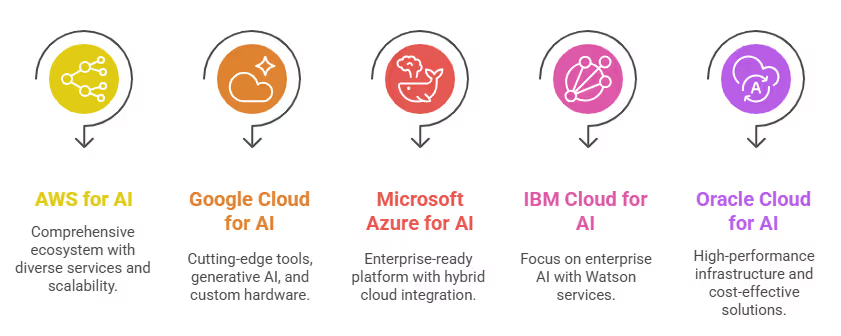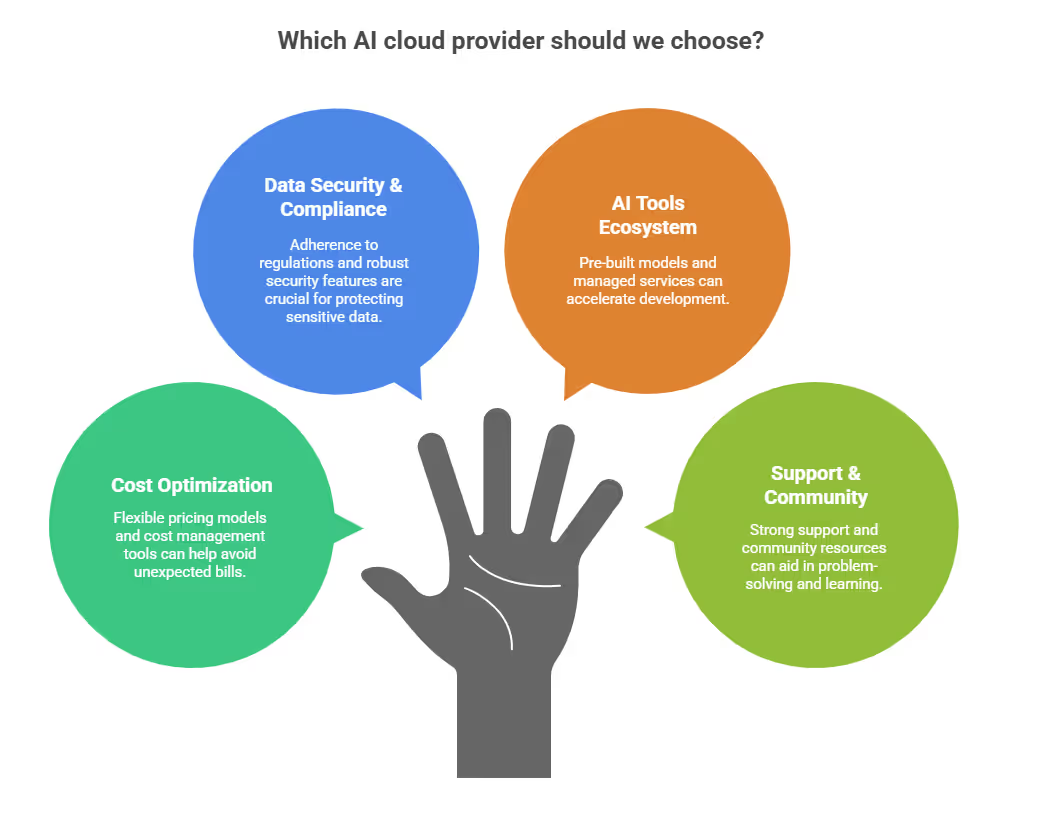Best Cloud Environment for AI Development: AWS vs Azure vs GCP

What is the best cloud environment for AI development?
The best cloud environment for AI development in 2026 depends on your project needs:
- AWS – Largest ecosystem, scalable for enterprises.
- Google Cloud – Best AI research tools (Vertex AI, TensorFlow).
- Microsoft Azure – Strong enterprise integration with Microsoft products.
- IBM Cloud – Trusted for secure, regulated industries.
- Oracle Cloud – High-performance GPUs for AI workloads.
For US businesses, AWS and Google Cloud lead in adoption, while startups often prefer Google Cloud for AI flexibility.
Cloud computing is essential for AI development because it provides the scalable infrastructure, flexible tools, and cost-effective solutions needed to train complex models and deploy applications.
By leveraging the cloud, businesses can overcome the significant hardware and resource limitations traditionally associated with AI, enabling faster innovation and wider adoption.
Top 5 Best Cloud Environments for AI Development
Cloud environments have become essential for AI development, offering the computational power, specialized tools, and scalability needed to train and deploy complex models. Choosing the right cloud provider is crucial, as each platform has a unique set of strengths, from pre-built AI services to custom machine learning frameworks.
The top five cloud environments for AI development are Amazon Web Services (AWS), Google Cloud, Microsoft Azure, IBM Cloud, and Oracle Cloud.
These platforms provide a robust infrastructure and a wide range of services that cater to the diverse needs of data scientists, machine learning engineers, and developers.

AWS for AI
AWS provides a comprehensive and mature ecosystem for AI development. It is often the go-to choice due to its extensive suite of services, global reach, and robust community support.
- Diverse Service Offerings: AWS offers a broad portfolio of AI and machine learning services. Amazon SageMaker is its flagship platform, providing a complete environment for building, training, and deploying machine learning models at scale. It simplifies the entire workflow, from data labeling to model deployment.
- Specialized AI Services: Beyond SageMaker, AWS has a variety of pre-trained AI services that can be integrated into applications with a simple API call. These include Amazon Lex for building conversational interfaces, Amazon Polly for text-to-speech, and Amazon Rekognition for image and video analysis. These services allow developers to add powerful AI capabilities without deep machine learning expertise.
- Scalable Infrastructure: AWS offers a vast selection of computing instances optimized for AI workloads, including GPU-accelerated instances (P and G series) and custom-built chips like AWS Inferentia and AWS Trainium for high-performance inference and training. This allows users to scale their infrastructure on demand, from small-scale experiments to large-scale, enterprise-level projects.
- Data and Analytics Integration: The seamless integration with other AWS services is a major advantage. Data can be stored and processed using services like Amazon S3 (storage) and Amazon Redshift (data warehouse), then easily accessed by SageMaker and other AI services. This integrated approach streamlines the entire data pipeline, making it easier to manage large datasets for model training.
Google Cloud for AI
Google Cloud has a strong reputation for innovation, particularly in the AI space, thanks to its deep-rooted expertise and powerful tools that are often at the forefront of AI research.
- Cutting-Edge AI Tools: Google Cloud offers services like Vertex AI, a unified platform for building and managing machine learning models. Vertex AI provides a single interface for the entire ML lifecycle, consolidating services that were previously separate, such as AI Platform and AutoML. This streamlined approach simplifies collaboration and workflow management.
- Generative AI and Large Language Models: As a leader in AI research, Google Cloud provides access to advanced models, including PaLM 2 and other models from its Imagen and Chirp families. Through its Generative AI Studio, developers can fine-tune and deploy these large language models for specific use cases, such as creating custom Generative AI Chatbots. This focus on cutting-edge models makes it a top choice for projects involving natural language processing and content generation.
- AI and Machine Learning APIs: Google Cloud provides a suite of easy-to-use, pre-trained APIs for common tasks. Services like Cloud Vision AI, Cloud Natural Language API, and Cloud Speech-to-Text allow developers to quickly integrate powerful AI capabilities into their applications without building models from scratch. These APIs are highly accurate and scalable, making them suitable for a wide range of applications.
- Custom Hardware for Performance: Google has invested heavily in custom hardware designed for AI. The Tensor Processing Units (TPUs) are specialized accelerators built for machine learning workloads, offering significant performance gains for training large models, particularly those built with TensorFlow. This hardware advantage gives Google Cloud a competitive edge for complex, large-scale training tasks.
Microsoft Azure for AI
Microsoft Azure is a strong competitor in the AI landscape, leveraging its enterprise-focused tools and seamless integration with the broader Microsoft ecosystem.
- Enterprise-Ready AI Platform: Azure Machine Learning is a robust platform that caters to both data scientists and developers. It provides a collaborative environment with tools for experiment tracking, model management, and MLOps (Machine Learning Operations). The platform supports various frameworks, including TensorFlow, PyTorch, and scikit-learn.
- Cognitive Services and Responsible AI: Azure's Cognitive Services offer a collection of pre-built APIs that enable developers to embed AI capabilities into their applications. These services cover a wide range of functions, including vision, speech, language, and decision-making. Azure also places a strong emphasis on Responsible AI, providing tools and guidelines to ensure models are fair, transparent, and secure.
- Hybrid Cloud and Integration: A key strength of Azure is its ability to support hybrid cloud environments through services like Azure Arc, which allows users to manage AI workloads on-premises, at the edge, and across multiple clouds. Furthermore, its deep integration with popular Microsoft tools like Visual Studio and GitHub streamlines the development workflow for many enterprises.
- Scalable Infrastructure: Azure offers a comprehensive range of GPU-enabled virtual machines from NVIDIA and AMD to support intensive training and inference tasks. The platform's global network and data center presence provide low-latency access and high availability for AI applications worldwide. This makes it an ideal choice for businesses already invested in the Microsoft ecosystem.
Choosing between AWS, Azure, or GCP for AI? Let us benchmark the options for your use case, request a free assessment.
IBM Cloud for AI
IBM Cloud has a strong focus on enterprise AI, particularly with its Watson brand, which offers a suite of pre-built, domain-specific AI services.
- Watson AI Services: IBM Watson is a well-known brand that provides a wide range of pre-trained AI services designed for business applications. These services include Watson Assistant for building conversational AI, Watson Discovery for document analysis and search, and Watson Studio for building, running, and managing AI models. The platform is especially strong in natural language processing (NLP) and speech-to-text.
- Focus on Hybrid and Multicloud: IBM Cloud is built on an open, hybrid-cloud architecture, allowing businesses to run AI workloads where it makes the most sense—whether on-premises or in different cloud environments. This flexibility is crucial for enterprises with complex data residency and security requirements.
- Governance and Trustworthy AI: IBM places a high priority on AI governance and ethical use. Its platform includes tools for managing the AI lifecycle, ensuring transparency, and mitigating bias. This focus on Trustworthy AI is a significant advantage for industries like finance and healthcare, where regulatory compliance is critical.
- Quantum Computing and Research: IBM is a leader in quantum computing, and it is actively integrating these advancements with its AI services. While still in its early stages, this forward-looking approach positions IBM as a key player in the future of AI and high-performance computing.
Oracle Cloud for AI
Oracle has emerged as a serious contender in the AI cloud space, leveraging its robust database and enterprise application background to provide a powerful and cost-effective platform.
- High-Performance Infrastructure: Oracle Cloud Infrastructure (OCI) offers a modern, high-performance platform for AI. It provides a wide range of GPU-accelerated computing instances, including NVIDIA A100 GPUs, which are essential for training large, complex models. OCI's network architecture is designed for low latency and high bandwidth, which is critical for distributing AI workloads.
- Cost-Effective Solutions: OCI is known for its competitive pricing and transparent cost structure. For AI workloads, which can be computationally expensive, this can lead to significant savings. The OCI Data Science service provides a collaborative environment for data scientists to build, train, and deploy models, with features like managed notebooks and model catalogs.
- Database and Data Analytics Integration: Oracle's deep expertise in databases is a major advantage. OCI offers seamless integration with its Autonomous Database, allowing users to easily connect their AI workloads with large-scale data sources. This synergy streamlines the entire data-to-insights pipeline and is particularly beneficial for businesses already using Oracle's enterprise software.
- Unified AI Services: Oracle provides a set of pre-built, managed AI services, similar to its competitors. These include services for vision, language, and anomaly detection. These services allow developers to quickly add intelligence to their applications without needing deep machine learning expertise. Oracle's strong focus on enterprise customers means these services are designed to integrate well with existing business processes and applications.
Comparison Table: Best Cloud Platforms for AI
Factors to Consider Before Choosing an AI Cloud
Choosing the right cloud provider for your AI workloads is a critical decision that can significantly impact your project's success. It's not just about selecting the biggest name; it's about finding a platform that aligns with your specific needs for performance, cost, security, and developer support.
Here are some key factors to consider before making your choice.

Cost Optimization
- Pricing Models: Look for a cloud provider with flexible pricing models that fit your usage patterns. Some offer pay-as-you-go, while others provide reserved instances or savings plans for predictable workloads.
- Cost Management Tools: Evaluate the platform's native tools for monitoring and managing your spending. Features like budget alerts, cost analysis dashboards, and resource tagging can help you avoid unexpected bills.
- Data Transfer Costs: Be aware of egress fees, the cost to move data out of the cloud. These can add up quickly, especially for data-intensive AI projects that require frequent data transfers.
Data Security & Compliance in the USA
- Compliance Certifications: For operations in the USA, ensure the cloud provider adheres to relevant regulations like HIPAA for healthcare data or SOC 2 for general security. This is crucial for protecting sensitive information and avoiding legal issues.
- Robust Security Features: The provider should offer strong security measures at all levels, including identity and access management (IAM), network security, and data encryption both at rest and in transit.
- Data Sovereignty: Understand where your data will be stored. Some providers allow you to choose a specific region or country to ensure your data stays within US borders, which is often a requirement for compliance.
AI Tools Ecosystem
- Pre-built Models and APIs: A rich ecosystem of pre-trained models and APIs for tasks like natural language processing, computer vision, and speech-to-text can accelerate your development process.
- Managed Services: Look for managed AI services that simplify the entire machine learning lifecycle, from data labeling to model deployment and monitoring. This can reduce operational overhead and let your team focus on building models.
- Framework Support: The platform should seamlessly integrate with popular AI frameworks like TensorFlow, PyTorch, and scikit-learn, giving your data scientists the flexibility to work with their preferred tools.
Support & Community
- Technical Support: Evaluate the different tiers of support offered by the provider. Access to timely and knowledgeable technical support is essential for resolving issues quickly, especially for mission-critical applications.
- Developer Community: A strong and active community, including forums, user groups, and extensive documentation, can be a valuable resource. It allows you to learn from others, find solutions to common problems, and stay up-to-date with new features.
- Training and Certification: Look for platforms that offer comprehensive training materials and certifications. These resources can help your team quickly get up to speed on the platform and demonstrate their expertise.
Use Cases of AI in Cloud
AI and cloud computing are a powerful combination, transforming industries across the United States. By leveraging the scalability and on-demand resources of the cloud, companies can deploy and train complex AI models without the need for significant on-premise infrastructure.
This synergy makes AI more accessible and enables a wide range of use cases that were previously unfeasible.
Healthcare
- AI in the cloud is revolutionizing healthcare by improving diagnostics and patient care.
- AI models hosted on cloud platforms analyze massive datasets of medical images, such as MRIs and CT scans, to help radiologists detect diseases like cancer with greater accuracy and speed.
- This capability also extends to predictive analytics, where AI algorithms predict disease outbreaks and hospital readmission risks by analyzing patient data.
- For instance, a cloud-based AI system can identify patients at high risk of developing a certain condition based on their electronic health records, allowing for proactive intervention.
Finance
- In the financial sector, AI in the cloud is crucial for enhancing security, personalizing services, and automating operations.
- Cloud-based AI systems are used for real-time fraud detection, analyzing transaction patterns to spot and flag suspicious activity instantly.
- They also power algorithmic trading, executing complex trades at high speeds based on market predictions.
- Furthermore, financial institutions are using cloud AI to develop personalized banking experiences, offering tailored financial advice and product recommendations to customers through intelligent chatbots and robo-advisors.
Retail
- Cloud AI is a game-changer for retail, helping businesses understand customer behavior and optimize their operations.
- Retailers use AI-powered cloud solutions for demand forecasting, predicting what products will be popular to manage inventory more efficiently and reduce waste.
- AI also enhances the customer shopping experience through personalized recommendations, suggesting products to shoppers based on their browsing and purchase history.
- In-store, AI can be used for things like cashier-less checkouts and monitoring shelf stock levels, which improves operational efficiency.
Startups
- For startups, the cloud provides a level playing field for adopting AI. Instead of investing heavily in their own servers, they can use cloud services to access powerful AI tools and computing resources on a pay-as-you-go basis. This allows them to quickly innovate and scale.
- Startups are using cloud AI to build and deploy solutions ranging from natural language processing (NLP) applications like Generative AI Chatbots to computer vision systems.
- They can develop and test new product features rapidly, getting to market faster and competing with larger, more established companies.
- The flexibility of the cloud enables them to experiment with different AI models without a large upfront investment.
Key Future Trends in Cloud AI
- Hybrid and Multi-Cloud Strategies: Businesses are moving away from relying on a single cloud provider. Instead, they will increasingly adopt multi-cloud and hybrid-cloud strategies to distribute workloads across different providers and on-premise environments. This approach allows them to select the best services from each vendor for specific tasks, optimize costs, and enhance resilience. For instance, a company might use one cloud for data storage and another for its AI development tools.
- Rise of Edge AI: While the cloud is excellent for training massive AI models, a growing need exists for processing data closer to its source. Edge computing, which brings AI processing to devices at the "edge" of the network, will become more prominent. This trend is crucial for applications that require real-time decision-making, such as autonomous vehicles and smart factories, as it significantly reduces latency and conserves bandwidth.
- AI-Driven Cloud Automation: The cloud itself will become more intelligent. AI will automate complex tasks within cloud platforms, including resource management, security, and scalability. This will make cloud services more efficient, secure, and easier to manage. AI-powered tools will automatically detect vulnerabilities, predict resource needs, and optimize performance without human intervention.
- Specialization and Democratization : Cloud providers will continue to offer highly specialized AI services, from pre-built models for specific industries like finance and healthcare to low-code and no-code platforms. This will democratize AI, allowing smaller businesses and individuals without deep technical expertise to build and deploy sophisticated AI-powered applications. It moves AI from a niche capability to a standard tool accessible to all.
- Sustainability: With the growing energy consumption of data centers and AI workloads, cloud sustainability is becoming a major focus. Future trends include providers investing in energy-efficient hardware and renewable energy sources. Businesses will also prioritize cloud partners with strong environmental, social, and governance (ESG) commitments, making sustainability a key factor in selecting a provider.
What's Next
Choosing the best cloud environment for AI development in 2025 depends on your specific needs. AWS remains the leader in scale and enterprise adoption, Google Cloud excels in AI research and tools, and Azure is best for Microsoft-integrated enterprises. Meanwhile, IBM Cloud and Oracle Cloud serve specialized needs like compliance and GPU-intensive AI workloads. For US developers, startups, and enterprises, the right choice balances cost, security, and AI capabilities. By carefully evaluating these platforms, you can accelerate innovation and build smarter AI applications.

